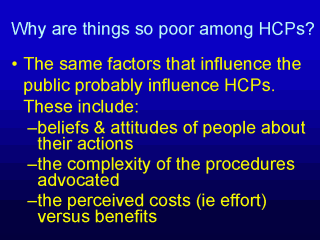| front |1 |2 |3 |4 |5 |6 |7 |8 |9 |10 |11 |12 |13 |14 |15 |16 |17 |18 |19 |20 |21 |22 |23 |24 |25 |26 |27 |28 |29 |review |
 |
Those reasons include: the beliefs and attitudes we hold about people and why they behave the way they do - these implicit lay theories do not accurately reflect the reasons for people’s behaviour - for example, we assume that when other people act “incorrectly”, it is because they have some character deficit - because they are “bad people”, yet when we ourselves act badly, we explain it by blaming events and circumstances. Conversely, when other people succeed, we often explain it by reference to good luck or favorable circumstances, but when we ourselves succeed. We attribute the reasons to our abilities. In other words, the implicit theories we use to explain our won behaviour are the opposite of those we use to explain other people’s behaviour. This is called Fundamental Attribution Error by psychologists. A s second set of reasons is that, often, changes require the adoption of new skills or practices where the person has low perceived self-efficacy for change or which are perceived as being complex or requiring high levels of ability or skill to master. Finally, there is the problem of the perceived benefits from making the change being seen as not worth the costs of the giving up the old behaviours. In other words, its too much trouble to learn a new set of behaviours. You can find out more by following the links at the end of this lecture to other related topics that considersome of these points further. |